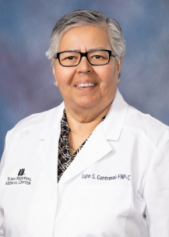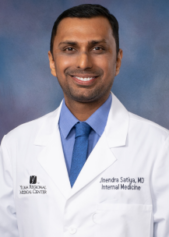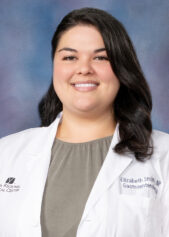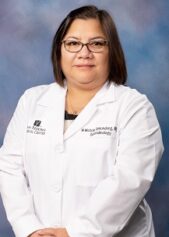Find digestive health care designed for you – right here, close to home.
Your digestive health is at the core of your well-being and healthy living.
That is why we work passionately every day to help you find relief and solutions for digestive disorders. Your digestive system is complex and has a significant effect on every other body system. Our providers specialize in your digestive health and always consider impact beyond your gastrointestinal system. We use advanced nutrition science and state-of-the-art technologies and techniques that complement compassionate and personalized care for your diagnosis and treatment.
Our inpatient and outpatient facilities make your access to care easy. With the addition of a new dedicated Endoscopy Center, you can take advantage of outpatient procedures there. And our adult and pediatric clinics give you convenient access to our specialists.
Digestive Health For Children
With a pediatric gastroenterologist on staff, there is no need to travel when your child needs specialized care.
Providers
Your digestive health is in good hands with our gastroenterology specialists. Make an appointment with one of our providers today.
Location
Conditions and Services
Onvida Health offers clinical laboratory and imaging diagnostics to accurately diagnose and treat your digestive health issues. Using advanced diagnostic technologies – including FibroScan, ultrasound, CT scan, reflux testing, colonoscopy, endoscopy and capsule endoscopy – our specialists can create the best care plan for your unique needs.
- Acid Reflux
- Crohn’s Disease
- Difficulty Swallowing (Dysphagia)
- Digestive Problems such as Constipation, Indigestion and Gastroparesis
- Gallbladder and Bile Duct Disorders
- Irritable and Inflammatory Bowel Conditions
- Liver Conditions
- Pancreas Disorders
- Peptic Ulcer Disease
- Stomach Pain
- Ulcerative Colitis
Barrett’s esophagus is a change in your cells lining your esophagus (food tube). It’s more common in people with acid reflux (GERD) but can develop without having GERD. Ablation therapy using heat or cold energy targets and destroys the damaged tissue/cells. This provides effective, long-term symptom management, helping to avoid potential complications, such as cancer.
A breath test measures hydrogen levels in the breath to help diagnose common digestive problems.
Capsule endoscopy is a diagnostic procedure that uses a tiny camera to examine portions of your small intestine.
Used to detect conditions affecting the large intestine (colon) and rectum, a colonoscopy is a common and effective screening tool for the early detection and prevention of colorectal cancer. With the insertion of a long, flexible viewing instrument (colonoscope) into your colon, your doctor can look for ulcers, tumors, polyps, obstructions and other problems. If one or more polyps are found, they can be biopsied and removed during the procedure (polypectomy).
A fecal test may also be a screening option for colorectal cancer. Fecal tests can detect abnormalities in the gastrointestinal tract but do not give conclusive results. Depending on the results, a colonoscopy may be needed to determine the presence of cancerous growths in your colon conclusively.
Your gastroenterologist will refer patients to a surgical specialist for this service and continued care. Our surgical specialists will expertly treat problems of the large intestine (colon, rectum and anus). Advanced laparoscopic techniques enable us to protect healthy tissues and preserve more of your body’s natural functions and your quality of life.
Your gastroenterologist will pass the endoscope through your mouth, then down your esophagus and stomach to your small intestine. Using a very thin tube inserted through the endoscope, he or she will administer a dye to highlight your organs on X-ray and thoroughly examine them for potential problems (e.g., tumors, blockages in the pancreatic ducts, infection in the bile ducts, etc.). Your GI doctor may also perform a biopsy and remove gallstones or blockages within the same procedure.
Stents can also be placed through an ERCP scope. Stents may be used in treating disorders of the esophagus, liver or other related conditions. Stents will keep open a blocked area. In the esophagus, it will help you swallow solids and liquids.
Endoscopic ultrasound (EUS) is a procedure completed to assess diseases of the gastrointestinal tract and nearby organs and tissues. This minimally invasive procedure combines the use of an endoscope – a small tube inserted into the gastrointestinal tract – and an ultrasound.
Acid reflux can scar your esophagus, narrowing it and making it hard to swallow food. Layers of excess tissue, cancer of the esophagus and scarring from radiation treatment can all cause narrowing. Your gastroenterologist will stretch out a narrowed area of the esophagus using a plastic dilator or inflating a balloon. Dilation usually occurs during an endoscopy.
A FibroScan is a type of ultrasound technology that measures liver stiffness and fatty changes in your liver.
Treatment focuses on reducing the risk of liver damage and preventing the spread of infection to others.
Infusion therapy is an effective way to provide treatment for severe digestive issues that haven’t responded well to oral medications. Patients who suffer from inflammatory bowel disease, iron deficiency anemia, Crohn’s Disease, ulcerative colitis and other similar disorders may benefit from infusion therapy. When applicable, patients may be referred for infusion therapy upon appropriate authorization from their insurance provider.
Should your condition warrant surgical intervention for liver, pancreas or bile duct issues, your gastroenterologist may refer you to a surgical specialist. Your gastroenterologist will refer you to a surgical specialist for your continued care.
Disorders such as Crohn’s disease, gastroparesis and celiac disease can affect your body’s absorption of life-sustaining nutrients from food. Not being able to eat certain foods without pain or other uncomfortable symptoms can be discouraging. Partnering with our registered dietitians, we offer a broad range of nutrition services to help you manage chronic illnesses and conditions with specific dietary recommendations. These programs can help alleviate problems associated with conditions like celiac disease, acid reflux and irritable bowel syndrome. Plus, by learning more about good nutrition, you can lower your risk for cancer, heart attacks and other health problems.
Percutaneous endoscopic gastrostomy (PEG) is a procedure in which a flexible feeding tube is placed through the abdominal wall and into the stomach. PEG delivers nutrition, fluids and/or medications directly into the stomach, bypassing the mouth and esophagus. Management of the PEG tube will be performed by a primary care provider
A sigmoidoscopy allows your provider to look inside your lower (sigmoid) colon and rectum using a flexible tube with a light on it.
Your provider may recommend a surgical procedure and refer you to a surgical specialist to treat your condition, often using a minimally invasive approach. From GERD surgery (to treat reflux) to hernia or esophagus surgery, your care is in good hands with our specialists.








